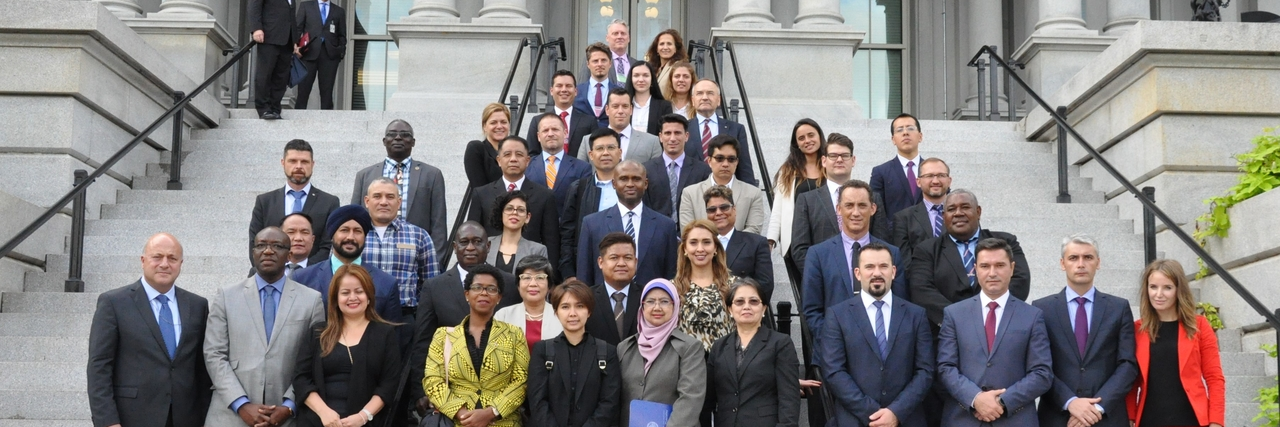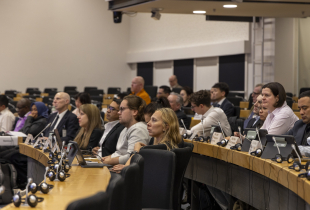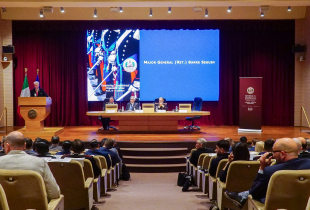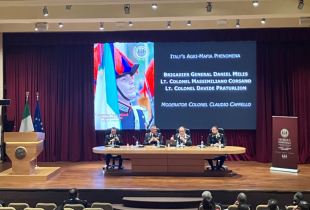
Countering Organized Crime Workshop Shows Importance of Marshall Center Network, Family
By Christine June
Public Affairs Office
George C. Marshall European Center for Security Studies
WASHINGTON, D.C. (Sept. 22, 2018) – The success of the Countering Transnational Organized Crime Community of Interest Workshop held here from Sept. 15 to 22 was due to the “Marshall Center family,” said Professor Joe Vann, director of the Program on Countering Transnational Organized Crime at the George C. Marshall European Center for Security Studies.
The Marshall Center is a 25-year U.S. Department of Defense and German Ministry of Defense transatlantic defense educational institution, which has more than 13,000 alumni from 154 nations.
“When we assess why we were successful. It came down to one essential fact, our alumni and our very extensive Marshall Center family,” Vann said. “We have a huge number of supporters who have spent time at the Marshall Center and appreciate the value of our work and mission.”
A part of the CTOC program at the Marshall Center, two COI alumni workshops are held every year at the center. This workshop was the first held away from the Marshall Center.
“This CTOC workshop in Washington D.C. was one of the most fulfilling experiences I have come across in my professional career,” said Josué González, Head of the Crime Analysis Department, National Security Commission of the Ministry of Interior in Mexico. “During one week, we learned and dialogued directly with high-level U.S. officials belonging to federal government, specialized security bodies and academic entities.”
Vann said one of the reasons that this workshop was held in Washington D.C. was to expose Marshall Center alumni to some of the U.S. institutions involved in countering transnational organized crime.
“We wanted to focus on the U.S. strengths in the areas of rule of law, good governance and the strengths of our institutions,” he said. “This whole-of-government concept is central to our CTOC program and a critical requirement in efforts to counter transnational organized crime.”
Also held twice a year, the CTOC program’s 24-day course emphasizes how transnational organized crime threatens the national security of our partner nations. It focuses on methods to combat this threat through the development of CTOC strategies, and whole-of-government and inter-regional solutions.
“My current activities in Mexico demand an important understanding of the major challenges that the world faces in coming years, especially those related with drugs, cartels and violence, and also, the development of high quality and internationally oriented analysis,” González said. “In this sense, this workshop was an invaluable experience that allowed me to play a key role in enhancing Mexican presence in the combat of global threats.”
The 37 attendees were alumni from the Marshall Center’s CTOC program and Program on Cyber Security Studies, who are involved in different aspects of countering transnational organized crime.
“Our visit was facilitated by our network of alumni, Marshall Center adjunct professors, and supporters,” Vann said.
The weeklong workshop began with a visit to the U.S. National Defense University hosted by PRISM Magazine, a security studies journal chartered to inform members of U.S. Federal Agencies, Allies, and other partners on complex and integrated national security issues.
“PRISM is a NDU publication where Michael Miklaucic, one of our visiting CTOC adjunct professor, is the editor,” Vann said. “We use PRISIM magazine, and other NDU books and publications in the CTOC course.”
At NDU, the participants listened to presentations by a panel on contemporary CTOC challenges. Retired U.S. Army Lt. Gen. Frederick S. “Rudy” Rudesheim, Director of one of the Marshall Center’s sister U.S. Department of Defense Regional Centers, William J. Perry Center for Hemispheric Defense Studies, addressed the group on the activities of criminal organizations in the Western Hemisphere.
The following day, the U.S. Federal Bureau of Investigation hosted the workshop attendees at their headquarters.
“Their leadership team put together a first-class event for us and painted a very comprehensive picture of the FBI’s enforcement activities against transnational organized crime,” Vann said. “This visit would not have happened without the support of retired Special Agent Dave Franco, who is a Marshall Center alumnus and now a visiting Marshall Center adjunct professor.”
“Thanks to Special Agent Shannon McGarry, also an alumnus and visiting CTOC adjunct professor, we met with the FBI’s Associate Deputy Director Paul Abbate and Special Agent Robert Johnson, the Assistant Director of the FBI’s Criminal Investigative Division,” he said.
Vann added that Assistant Director Johnson was previously a Marshall Center adjunct professor for the Marshall Center’s Program on Terrorism and Security Studies.
“We were able to speak about continued engagement between the FBI and the Marshall Center,” Vann said. “This is a win for both of us, but most importantly for our future Marshall Center participants and alumni.”
In the afternoon, the workshop attendees visited the White House Office of National Drug Control Policy. Steve Johnston, a visiting Marshall Center CTOC adjunct professor who works for the ONDCP, arranged this visit, said Vann. James Collins, the ONDCP Director for the Transnational Organized Crime and Transnational Threat Directorate, and his key deputies addressed the group.
“These discussions informed the group on the U.S. policy aspects of the fight against transnational organized crime from the perspective of the executive branch of our government,” Vann said.
Wednesday, the Office of Congresswoman Martha McSally hosted the group on Capitol Hill. Congresswoman McSally was a professor of national security studies at the Marshall Center prior to her election to the U.S. Congress.
“Congresswoman McSally and her staff put together a great program for us,” Vann said. “We had a number of excellent presentations that focused on how the U.S. Congress supports efforts to tackle transnational organized crime.”
They heard from the Congressional Research Service and number of senior staffers from the Homeland Security and Judiciary committees detailing how seriously the Congress takes the matter of transnational organized crime.
“Congresswoman McSally was quick to understand the importance of this visit and offer her assistance,” Vann said. “Her previous experience as a professor of national security studies at the Marshall Center was instrumental in making our visit to Capitol Hill a success.”
The group also visited the Department of Justice’s Terrorist Screening Center. Established in the aftermath of the Sept. 11, 2001 terrorist attacks, TSC tracks and places suspected terrorists on a watch list and shares this information with international partners.
“TSC is now evolving and will be examining the movement of transnational criminals as well,” Vann said.
He added that Cindy Franco, Associate Legal Counsel at the TSC, and Dave Franco’s wife, facilitated this visit.
The next visit was to the Financial Crimes Enforcement Network—better known as FinCEN. Tom Ott who is the Associate Director of Enforcement at FinCEN arranged this visit.
“Tom has lectured at the CTOC course at the Marshall Center, and was quick to appreciate the importance of articulating the mission of FinCEN to our alumni.” Vann said.
FinCEN Director, Kenneth Blanco addressed our group and detailed how FinCEN wages the fight against TOC from the financial enforcement perspective. He was followed by a number of his deputies who provided a detailed overview of the various functions of FinCEN in addressing TOC.
“We all understand that to defeat transnational criminal organizations you have to deprive them of their money,” Vann said. “Our visit to FinCEN brought this home in a very comprehensive way.”
On the final day, the group visited the headquarters of the Naval Criminal Investigative Service. Vann said NCIS Special Agent John Fencsak, the CTOC Deputy Director, who is on loan to the Marshall Center from NCIS, and NCIS Director Andrew Traver, who has lectured at the Marshall Center, made this visit possible.
“Director Traver welcomed us and we then received presentations on how military investigative agencies support the national efforts to combat transnational organized crime,” Vann said.
The group received presentations from the Air Force Office of Special Investigations, the Army Criminal Investigation Command, and NCIS. The NCIS lecture paid particular attention to NCIS’ role in supporting the narcotic interdiction efforts taking place in Southwest Asia and East Africa.
“We heard lectures and deep debates around relevant issues such as combating transnational organized crime and terrorism, new trends of drugs, emerging technologies, techniques to fight against crime, global threats, law enforcement and rule of law between others,” said González. “The exchange of ideas we had with the U.S. government staff, experienced practitioners, international partners and scholars, turned out to be an incredible mixture of realities, perspectives, insights and best practices.”
To make the visit complete, the Marshall Center’s alumni team organized an alumni event and invited Marshall Center alumni serving in the D.C. metro area.
“We had a great turnout with serving Ambassadors, senior embassy officials, and a host of other Marshall Center alumni representing their embassies or their military organizations,” Vann said.
He added, “Overall, this was a great visit and a great opportunity to share some of our U.S. best practices with some of our very senior CTOC alumni who are all currently serving as government security professionals. Our success was made possible because of the extensive network of Marshall Center supporters serving within the U.S. government.”
“We continually say that it takes a network to defeat a network. In this case it was clear that our Marshall Center Network is alive and well and growing ever stronger.”


